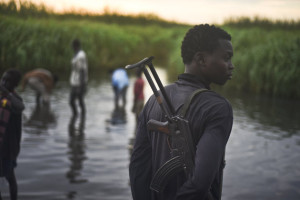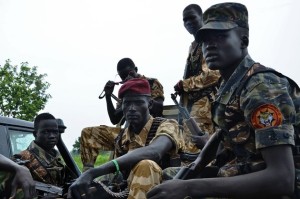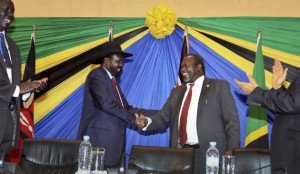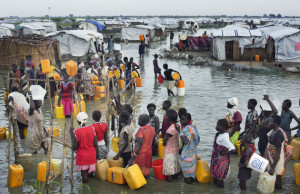PBS: Escaping Eritrea … [Read More...] about ካብ ውሽጢ ቤት ማእሰርታት ኤርትራ
South Sudan’s War Has Raged For Two Years, Making Some People Very Rich
Charlotte Alfred | 12 December 2015| Huffington Post
“Greed is driving the calculations of South Sudan’s government and rebel leaders,” the leader of one advocacy group said.

South Sudan on Tuesday marked a grim milestone. It’s been two years since the rivalry between the nation’s top two leaders erupted into bloodshed on the streets of the capital city of Juba and drew the new nation into civil war.
The conflict shattered hopes that South Sudan’s independence from Sudan in 2011 would usher in an era of peace and prosperity for the resource-rich but chronically underdeveloped region, after decades of war with the government in Khartoum.
Instead, tens of thousands of people have been killed and over 2 million displaced since the conflict broke out on Dec. 15, 2013. Many are hiding from the mass atrocities in the bush or swamps, barely surviving on a diet of water lilies and swamp fish.
Yet some people have prospered during South Sudan’s bloody civil war, according to a report released on Tuesday by the U.S.-based advocacy group Enough Project.
The report documents how elites on all sides of the conflict have profited from the war: government allies through the oil trade and currency speculation; rebel leaders through wealthy donors; and a plethora of militias that benefit from gold mining, timber logging and wildlife poaching amid the chaos.
“This war has been hell for the people of South Sudan, but it has also been very lucrative for their leaders,” the founding director of Enough Project, John Prendergast, told a hearing of the U.S. Senate foreign relations committee last Thursday, urging the U.S. government to strengthen sanctions on corrupt officials fueling the bloodshed. “‘War crimes pay’ has been the message,” he warned.
While warring leaders President Salva Kiir and former vice president Riek Machar signed a peace deal in August, they have already missed key deadlines in implementing the deal. The leaders have made and broken at least seven previous ceasefires. The latest deal has lasted longer than most and had at least some tangible results — the Ugandan military withdrew its troops last month — but the fighting has raged on and the humanitarian crisis has worsened.
The Enough Project says some of the loudest voices opposing the peace deal in South Sudan are those who have amassed power and money during the war.
If implemented, the agreement would threaten their hold on South Sudan’s resources, because it requires government and opposition supporters to share power. It also would try to clean up the government corruption that helped fuel the conflict, including in the lucrative oil sector.
The government does not currently disclose total oil revenues, or how the money is spent. According to a report in The Indian Ocean Newsletter, citing a European Union memo, the government collects around $60 million a month in oil revenues, despite falling oil prices and conflict interrupting oil production, and spends 70 percent of its total budget on security. The peace deal would require the government to be more transparent by closing illicit oil accounts and centralizing oil revenues in an account that reports regularly to the public.

This would also disrupt currency leveraging schemes by South Sudanese officials, who exploit the collapse of the South Sudanese pound in relation to the U.S. dollar, the report says. They have rare access to U.S. dollars at the official exchange rate through oil revenues, and exchange them on the black market for five or six times what they would get in an official exchange.
While some members South Sudan’s elite have been counting their profits, the war has decimated the country’s already struggling economy, and could end up costing $28 billion in lost revenue over five years, according to a January report by U.K.-based consultancy Frontier Economics.
“Greed is driving the calculations of South Sudan’s government and rebel leaders,” Prendergast told the U.S. Senate foreign relations committee last week. “To protect their ill-gotten wealth, government officials spent a large portion of the national budget on security at the expense of infrastructure development, health, and education.”
The U.N. Security Council in July imposed sanctions on three government generals and three rebel generals, but critics are calling for further sanctions, and say they should target more senior commanders.
“South Sudanese elites are vulnerable to the impact of targeted sanctions,” the report says. “They depend on access to [U.S. dollar] accounts and assets to conduct business in the region; access hospitals and medical services in nearby Kenya and South Africa; pay for schools for their children in the region, the United States, Australia, and Canada; and move freely between their homes in

Juba and those of their families overseas.”

